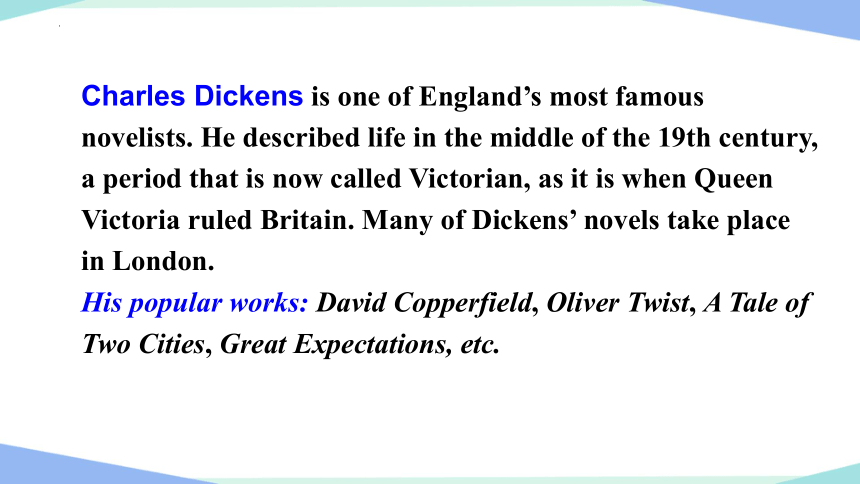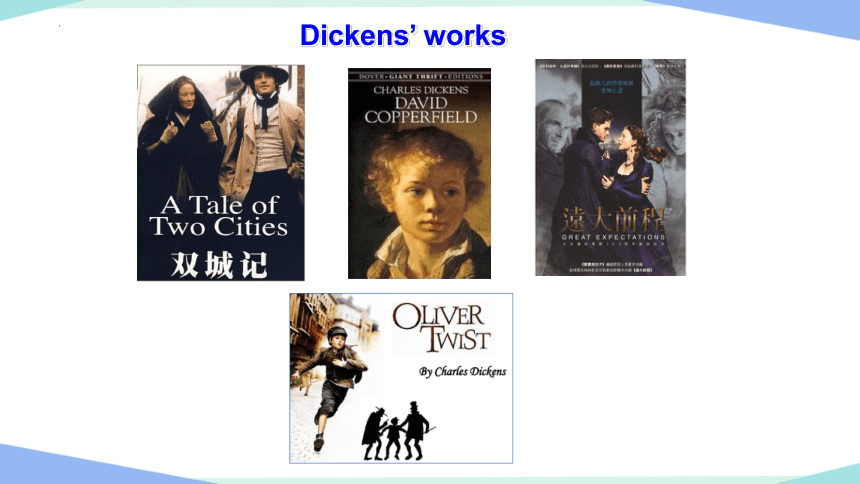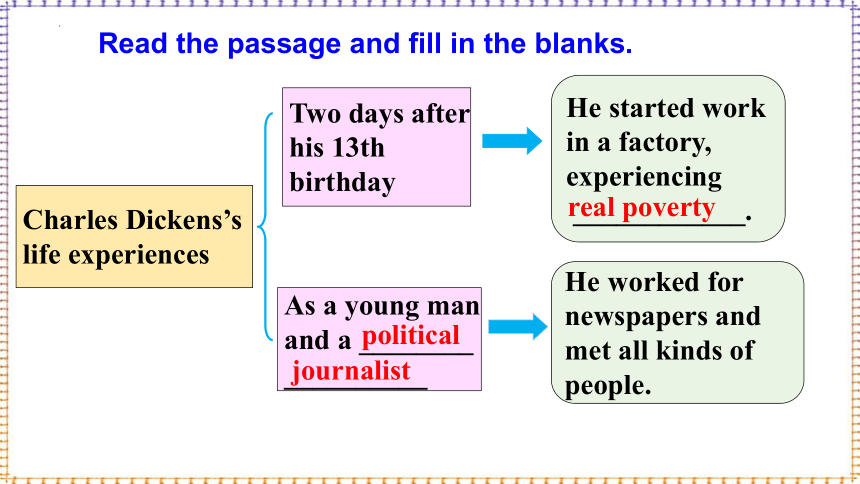外研版选修七Module3 Literature- Cultural Corner课件(15张PPT)
文档属性
| 名称 | 外研版选修七Module3 Literature- Cultural Corner课件(15张PPT) |

|
|
| 格式 | zip | ||
| 文件大小 | 1.4MB | ||
| 资源类型 | 教案 | ||
| 版本资源 | 外研版 | ||
| 科目 | 英语 | ||
| 更新时间 | 2022-03-09 11:33:10 | ||
图片预览







文档简介
(共15张PPT)
Module 3 Literature
1. To learn some new information about Oliver Twist and Charles Dickens.
2. To know how Dickens’ novels helped to improve
English society.
Charles Dickens (1812-1870)
Charles Dickens is one of England’s most famous novelists. He described life in the middle of the 19th century, a period that is now called Victorian, as it is when Queen Victoria ruled Britain. Many of Dickens’ novels take place in London.
His popular works: David Copperfield, Oliver Twist, A Tale of Two Cities, Great Expectations, etc.
Dickens’ works
Read the passage and fill in the blanks.
Charles Dickens’s
life experiences
Two days after
his 13th
birthday
He started work
in a factory,
experiencing
____________.
As a young man
and a ________
__________
He worked for
newspapers and
met all kinds of
people.
real poverty
journalist
political
In his early
thirties
He started writing ______
and became successful
almost immediately.
In 1838
His second novel, _______
_______ was published. It
brought _____________ to
the attention of the public.
It is a very important
novel.
novels
child poverty
Charles Dickens’s
life experiences
Twist
Oliver
He wrote a large number
of popular novels that are
still read today. He often
wrote about the problems
of poor people, and as a
result of his work, the lives
of the poor were _______.
Over the next
25 years
improved
Charles Dickens’s
life experiences
Read the passage again and answer these questions.
1. What experiences from his own life did Dickens use in his novels
His own father was in prison and he worked in a factory as a child; he was also very poor.
2. What new information have you learnt about Oliver Twist
3. How did Dickens’ novels help to improve English society
They made people aware of child poverty and made them want to do something about it.
1. Dickens always had a huge amount of energy.
a huge amount of 大量的
英语中有些表示“许多, 大量”的短语, 后接可数名词与不可数名词情况不同。
a good/great many
a large/great/good number of
a good few/quite a few
+可数名词复数(作主语时, 谓语动词用复数)
many a/an+单数可数名词 (作主语时, 谓语动词用单数)
a good/great deal of
a large/great amount of
quite a little
+不可数名词(作主语时, 谓语动词用单数)
a lot of/lots of
plenty of
a large/great quantity of
+可数名词复数或不可数名词(作主语时, 谓语动词要根据名词确定)
large quantities of+可数名词复数或不可数名词(作主语时, 谓语动词用复数)
【语境应用】从括号内选择适当的单词填空。
1) A large number of houses ______ (was / were) destroyed in the earthquake.
2) Large amounts of my spare time ______ (is / are) wasted in watching TV series.
3) A large quantity of flowers ______ (has / have) been planted in our school.
were
are
has
Work in groups and finish TASK on page 42.
Module 3 Literature
1. To learn some new information about Oliver Twist and Charles Dickens.
2. To know how Dickens’ novels helped to improve
English society.
Charles Dickens (1812-1870)
Charles Dickens is one of England’s most famous novelists. He described life in the middle of the 19th century, a period that is now called Victorian, as it is when Queen Victoria ruled Britain. Many of Dickens’ novels take place in London.
His popular works: David Copperfield, Oliver Twist, A Tale of Two Cities, Great Expectations, etc.
Dickens’ works
Read the passage and fill in the blanks.
Charles Dickens’s
life experiences
Two days after
his 13th
birthday
He started work
in a factory,
experiencing
____________.
As a young man
and a ________
__________
He worked for
newspapers and
met all kinds of
people.
real poverty
journalist
political
In his early
thirties
He started writing ______
and became successful
almost immediately.
In 1838
His second novel, _______
_______ was published. It
brought _____________ to
the attention of the public.
It is a very important
novel.
novels
child poverty
Charles Dickens’s
life experiences
Twist
Oliver
He wrote a large number
of popular novels that are
still read today. He often
wrote about the problems
of poor people, and as a
result of his work, the lives
of the poor were _______.
Over the next
25 years
improved
Charles Dickens’s
life experiences
Read the passage again and answer these questions.
1. What experiences from his own life did Dickens use in his novels
His own father was in prison and he worked in a factory as a child; he was also very poor.
2. What new information have you learnt about Oliver Twist
3. How did Dickens’ novels help to improve English society
They made people aware of child poverty and made them want to do something about it.
1. Dickens always had a huge amount of energy.
a huge amount of 大量的
英语中有些表示“许多, 大量”的短语, 后接可数名词与不可数名词情况不同。
a good/great many
a large/great/good number of
a good few/quite a few
+可数名词复数(作主语时, 谓语动词用复数)
many a/an+单数可数名词 (作主语时, 谓语动词用单数)
a good/great deal of
a large/great amount of
quite a little
+不可数名词(作主语时, 谓语动词用单数)
a lot of/lots of
plenty of
a large/great quantity of
+可数名词复数或不可数名词(作主语时, 谓语动词要根据名词确定)
large quantities of+可数名词复数或不可数名词(作主语时, 谓语动词用复数)
【语境应用】从括号内选择适当的单词填空。
1) A large number of houses ______ (was / were) destroyed in the earthquake.
2) Large amounts of my spare time ______ (is / are) wasted in watching TV series.
3) A large quantity of flowers ______ (has / have) been planted in our school.
were
are
has
Work in groups and finish TASK on page 42.
